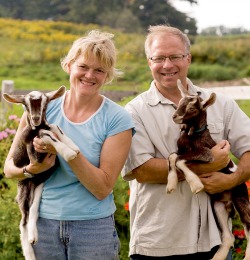Crème de la crème
Allison Hooper '81 P'16 is crafting some of the world's best cheese

Located in Websterville, Vt., the creamery sends its high-quality goat and cow milk products everywhere from farmers markets to acclaimed French chefs.
Hooper helped start the company just three years after graduation from Connecticut College, but her foray into cheese-making began during her junior year. StudyingFrench in Paris, Hooper decided to extend her stay into her senior year to further immerse herself in the culture. The only problem: finding a place to stay for the summer while school was out of session.
Stuck in a foreign country with no immediate plan, she accepted an offer to live on a family-owned dairy farm in the Brittany region of France. It was there, immersed with French-speaking locals, that she developed her language skills — but also an ability to make cheese.
“It wasn’t intentional,” Hooper says. “I certainly didn’t have cheese-making in mind when I went abroad.”
A few years later, however, those skills came into good use. Working at a dairy lab in rural Vermont in 1984, Hooper was contacted by Bob Reese, who was planning a dinner event using local agricultural products but had no locally made cheese. In short order, Hooper whipped up some chèvre from scratch and saved the day.
From that moment, the idea of Vermont Creamery was born. With only $1,200, Reese and Hooper quit their jobs and began operations out of a converted milk house 30 years ago. “Not having something to fall back on really forced us to push hard for success,” Hooper said.
What set the company apart from the beginning was its focus on artisanal cheese that used natural, farm-to-table ingredients. Hooper said Americans weren’t really consuming products like goat cheese, and the company was part of a movement that has now taken over the food industry.
“It was a very big challenge, especially for a 25-year-old woman, to establish goat dairying as legitimate farming in those early days,” she says.
Getting in at the start of the natural foods trend allowed Hooper to cultivate her business’s brand. One of the driving principles behind the creamery’s mission has been sustainability. To Hooper, this means thinking globally and acting locally; Vermont Creamery is B Corp-certified, a qualification that is to sustainable business what Fair Trade is to coffee. Companies with this certification must meet high standards of social and environmental performance, accountability and transparency. Other B Corp participants include Ben & Jerry’s, Etsy and Patagonia.
Vermont Creamery is also home to the largest rooftop solar system in Vermont, and is looking for new ways to reduce its carbon footprint. “In the future, we’d like to invest in converting our waste into energy that would power our creamery,” Hooper says.
And through a new collaboration with the Evergreen Conservative Partnership, Hooper has established a model commercial goat dairy, a project aimed at introducing potential and established farmers to goat dairying.
With a résumé that includes a wide array of skills, from goat milking to business management, Hooper points to her College education as an essential part of her professional and personal development.
“I believe a liberal arts education teaches you how to think. It teaches you how to solve problems and how to relate to all kinds of people,” she said. Hooper adds that her French skills have also come in handy when working with world-class chefs and restaurateurs, as speaking their language gives her more credibility.
Oh, and the cheese? Hooper does have a favorite. “I love comté. It’s nicknamed ‘King of Cheese,’ and symbolizes traditional methods and community.”
It’s a fitting choice for a woman who took an untraditional path to create a thriving business with a social conscience.